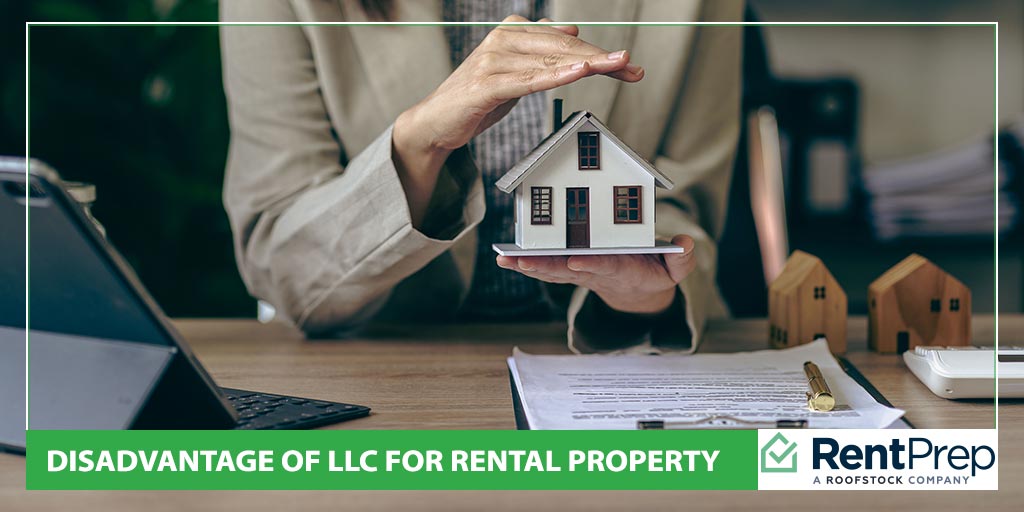
As landlords grow their rental businesses, many choose to set up LLCs to create a divide between business and personal matters and shield personal assets from potential business liabilities. While this strategy boasts numerous advantages, it comes with its own set of drawbacks.
This article will focus on the disadvantages of using an LLC to manage rental properties. These drawbacks should be considered and weighed against the advantages before setting up your LLC. We’ll also look at alternatives to LLCs for landlords seeking effective asset protection. Making informed decisions that align with your long-term rental property management goals is essential.
Table Of Contents: LLCs And Rental Properties
How do LLCs work for managing rental properties, and what are the advantages and disadvantages for landlords? Find out below.
- Benefits Of Using An LLC To Manage Rental Properties
- Disadvantages Of LLCs For Rental Properties
- Alternatives To An LLC For Landlords
- FAQs – LLCs And Rental Properties
- Why is financing more difficult for an LLC?
- What are the initial and ongoing costs associated with an LLC?
- How does an LLC affect my mortgage interest deduction?
- Can transferring my properties to an LLC trigger a due-on-sale clause?
- Is the liability protection offered by an LLC absolute?
- Can I use my LLC-held properties for personal purposes?
- Should You Set Up An LLC?
Benefits Of Using An LLC To Manage Rental Properties

There are many benefits to forming an LLC to manage a rental property portfolio, which is why it has become a common practice. Among the principal benefits of utilizing an LLC are:
Personal Asset Protection
An LLC’s main benefit is separating your personal and business assets. This means that if a lawsuit arises concerning your rental property, your personal assets, such as your family home, can be protected. This means that it can’t be forfeited to pay for things such as legal damages.
Tax Advantages
Another benefit of an LLC is that you can pass taxes through the owner’s personal tax and avoid the double taxation that can result from other types of corporations. As the rental property owner, you can still deduct things such as mortgage interest, depreciation, and operating expenses from your personal taxes.
Manage Partnerships
LLCs can also be beneficial when partnering with someone to buy, manage, and rent properties. The LLC offers a framework for establishing the legal relationship between the two of you, your ownership percentages and responsibilities, what will happen if one person decides to pull out, and so forth.
Business Matters
Depending on the type of business you are in, an LLC identity can add an element of professionalism. This can be especially important when managing commercial properties or large property portfolios.
You can read our full guide to setting up and using LLCs for rental property management here.
But while these are all excellent benefits, they need to be considered in balance with the disadvantages. Furthermore, you only receive these benefits if the LLC is properly set up and managed.
Disadvantages Of LLCs For Rental Properties
So, what are the disadvantages of LLCs that landlords should be aware of before setting up to manage their rental property business and portfolio?
1. Initial And Ongoing Costs
Significant costs can be associated with setting up an LLC, including filing fees. The amount depends on the state where you file and can range from $35 to $500. Most states then also have a mandatory annual or biennial fee to keep your LLC compliant. If you don’t pay them, there can be additional fees.
If you set up your LLC in New York, you can expect to pay $200 as an initial fee and then $9 every two years. In contrast, in Washington, DC, it’s just $99 to set up your LLC, but then there is a $300 fee every two years. Massachusetts is the most expensive, with an initial fee of $500 and then a $500 annual fee.
2. Pursuing Financing
Quirks of the system mean that it tends to be harder for LLCs to secure mortgage loans than for individuals, and you may also be offered less favorable terms. Loans often require a higher down payment and higher interest rates.
This is related to risk. When an individual gets a loan to buy a home they intend to live in, banks know they are highly invested in that property and much less likely to default than a business that might decide to write a property off as a loss. Therefore, higher deposits and interest rates are often applied to cover the increased risk when purchasing rental property.
3. Property Transfer Issues
The same rules do not always apply when transferring a personally owned property to an LLC rather than to another person. Principally, it can activate a due-on-sale clause in existing mortgages. This can require the full mortgage balance to be paid when ownership changes.
4. Limited Liability Protection Is Not Fool-Proof

While an LLC’s main benefit is protecting your personal assets from business debts, that protection is not ironclad. If the LLC takes out a mortgage or another loan, the owner will probably have to guarantee that loan if the LLC itself does not have the assets to do so. This reduces liability protection by intertwining your personal and business assets in a separate agreement.
In addition, if you do not operate your LLC separately from your personal finances, you are not maintaining the appropriate boundary between your personal and business liabilities.
Both of these situations can see your personal assets on the line if your business is required to satisfy debts.
5. Administrative Overheads
Properly managing an LLC can have significant administrative overheads when it comes to record-keeping, formulating legal documents, and so forth. Depending on the size of your property portfolio and rental business, this can represent a significant additional expense.
6. Tax Implications
If you are the sole owner of an LLC, you can make all the same deductions on your personal taxes, such as mortgage interest, depreciation, and business expenses. However, multiple-member LLCs have different rules regarding taxation, and you may lose the ability to claim these tax benefits.
You also become subject to self-employment tax with an LLC, which is higher than tax for an employee, and you should separate this money throughout the year to pay your tax bill.
7. Reduced Flexibility
An LLC can reduce your flexibility in how you use your rental property. For example, in some states, you can only end a lease for specific reasons, such as the owner moving into the property. If you decide to move into one of your properties, it may be difficult to force the current tenant to leave on the basis that the LLC is the owner of the property and not you.
Alternatives To An LLC For Landlords
Landlords do have alternatives to LLCs to manage their property portfolios, but each comes with its own disadvantages and potential challenges.
Sole Proprietorship
Setting up a sole proprietorship lets you own and manage a property as an individual and is much simpler to set up and operate than an LLC. But you don’t get the same liability protection with a sole proprietorship, so your personal assets get tied up in the business.
Partnership
If you are working with someone else to buy properties and build a rental business, a partnership provides a structure for managing resources and responsibilities between the partners. But again, a partnership does not provide the same liability protection as an LLC.
S Corporation
An S Corporation is a special type that sets up shareholders who can pass profits and losses through their personal taxes. It offers strong limited liability protection but is complex to set up and must operate under strict rules and regulations.
C Corporation
A C Corporation is an entirely separate legal entity from its owners, offering the strongest form of liability protection. But this means the business is subject to double taxation on corporate profits and shareholder dividends. This is also a complex form of business to maintain, which means incurring administrative overhead.
Real Estate Investment Trust (REIT)
A REIT is a company that owns, operates, or finances income-producing real estate in the service of investors. It’s a way to invest, but in most cases, you sacrifice direct property ownership and control of business decision-making.
Trusts
Trusts are another format that offers effective protection against personal liability when managing assets. However, there is a complex structure and specific tax implications.
While these are all potential options, an LLC is probably the best choice for most small-scale landlords.
Listen to our podcast on whether landlords should create an LLC here.
FAQs – LLCs And Rental Properties
Below are answers to some of the most frequently asked questions about LLCs and rental properties.
Why is financing more difficult for an LLC?
Financing is often more challenging for an LLC because lenders typically perceive a loan to a business as riskier than a loan to an individual.
LLCs, especially new ones, may lack credit history, and lenders might require higher interest rates or larger down payments. Additionally, due to regulatory restrictions, many banks prefer not to lend to LLCs for residential properties.
What are the initial and ongoing costs associated with an LLC?
The initial costs include filing fees for setting up the LLC, which vary by state. Ongoing costs can include annual state fees, franchise taxes, and the need for separate tax filings for the LLC.
These costs can add up, especially for a small portfolio, and might outweigh the benefits of having an LLC.
How does an LLC affect my mortgage interest deduction?
Mortgage interest deductions that are normally claimed on personal tax returns cannot be claimed if the mortgage is in the name of an LLC. This could lead to a higher tax liability for the individual, as they lose out on a significant personal tax deduction.
Can transferring my properties to an LLC trigger a due-on-sale clause?
Yes, transferring personal properties into an LLC can trigger a due-on-sale clause in your mortgage agreement. This clause allows the lender to demand full repayment of the outstanding loan if the property is sold or transferred, which could be financially challenging.
Is the liability protection offered by an LLC absolute?
The liability protection provided by an LLC is not absolute. If you personally guarantee a loan for the LLC, you are liable for that debt.
Additionally, if the LLC is not operated correctly, with a clear separation of personal and business finances, a court could “pierce the corporate veil” and hold you personally liable for the LLC’s debts.
Can I use my LLC-held properties for personal purposes?
Answer: Using properties held in an LLC for personal purposes can complicate matters. It can blur the lines between personal and business use, potentially jeopardizing the LLC’s liability protection and causing tax complications.
Should You Set Up An LLC?
Should you set up an LLC to manage your rental business? It’s probably the most effective and accessible way to separate your personal and business finances in the rental industry, but whether this is worth doing depends on your circumstances, such as the size of your portfolio and your risk exposure.
Whatever you do, make sure you set up and manage your LLC properly. If you don’t respect the divide between your personal and business finances when managing your rental business, you lose the liability protection the LLC is supposed to provide.
Note: RentPrep does not provide tax, legal or accounting advice. This material has been prepared for informational purposes only and is not intended to provide, and should not be relied on for, tax, legal, or accounting advice. You should consult your own tax, legal, or accounting advisors.

